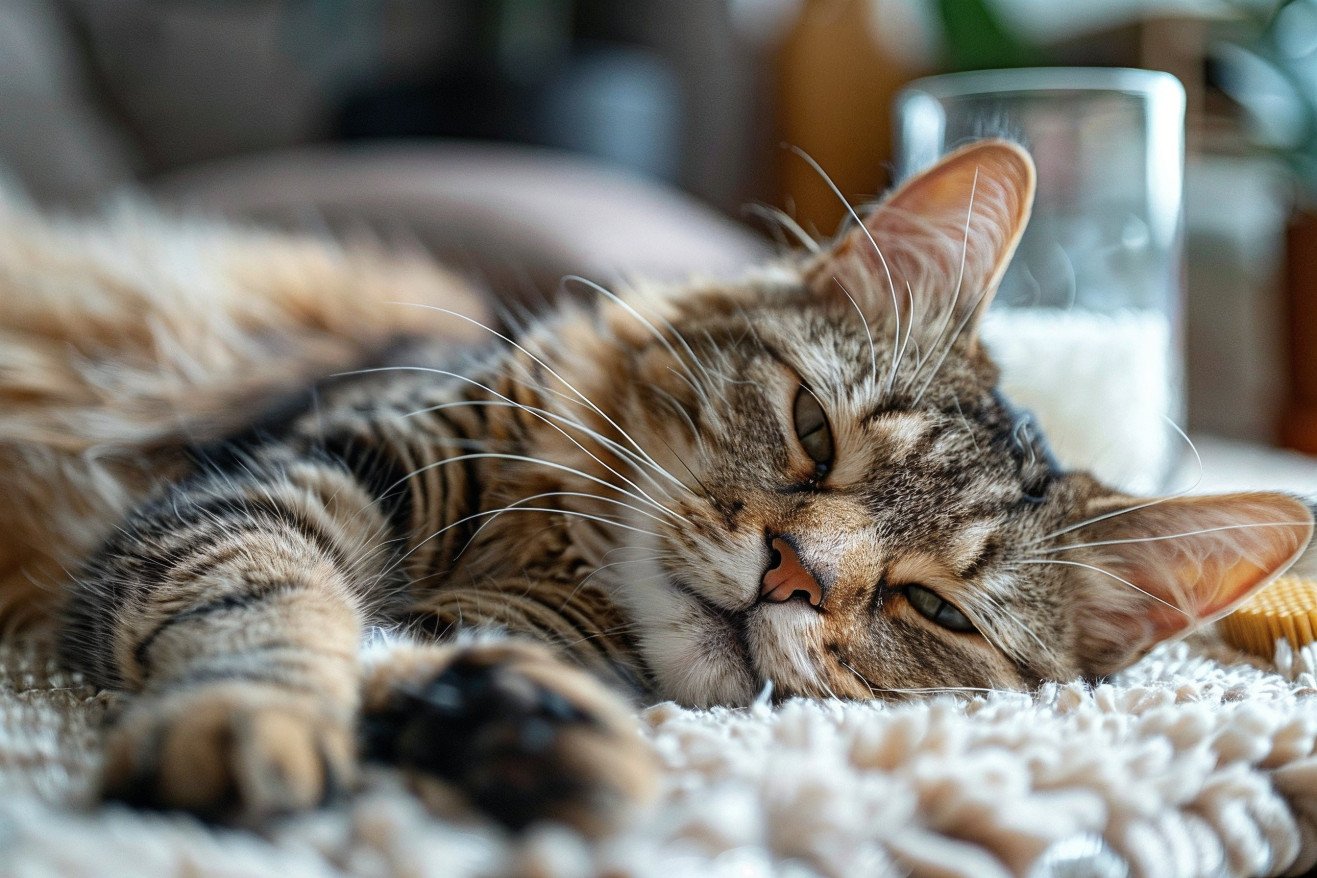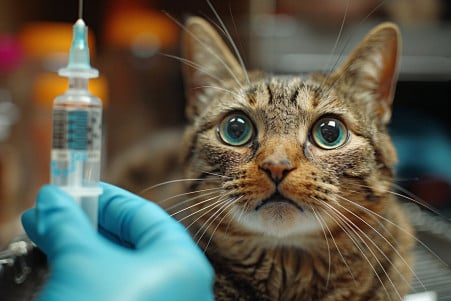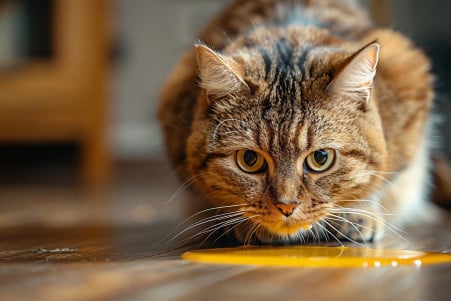Cat Vomiting Home Remedies: A Complete Guide
19 April 2024 • Updated 19 April 2024

If your cat has been throwing up more than usual, there are a number of home remedies and potential causes to think about before heading to the vet. Some of the best home remedies for cat vomiting include fasting for 12-24 hours to give the stomach a chance to recover, feeding a bland diet of boiled chicken and rice, making sure your cat has plenty of fresh water, eliminating any potential toxins, and using natural anti-nausea remedies like ginger or slippery elm bark.
To help you better understand, we've compiled information from a number of studies and experts to help you learn how to deal with your cat's vomiting with easy home remedies and preventive measures. By learning about the potential causes and evidence-based home remedies, you can help your cat feel better and figure out if you need to see a vet. This article includes information from a variety of holistic, veterinary, and nutritional sources to make sure you get a well-rounded view.
What are the best home remedies for cat vomiting?
Signs and Symptoms That Your Cat Needs Veterinary Attention
Even though vomiting is normal and not usually a cause for concern in cats, there are some signs that your cat needs to see a vet right away. According to Dr. Sarah Teller from the Texas A&M College of Veterinary Medicine, vomiting more than once a day, vomiting with other symptoms like lethargy or loss of appetite, and vomiting with foreign material or thick yellow bile are all signs that your cat's vomiting could be a sign of a more serious issue.
The PDSA says that you should call your vet immediately if your cat has been vomiting for more than 24 hours, can't keep any food or water down, looks very unwell, or has other symptoms like diarrhea, lethargy, tummy pain, or blood in their vomit. If your cat can't keep any fluids down, they can become dehydrated very quickly, and if there's blood in their vomit, it could be a sign of internal bleeding or a blockage.
According to VCA Animal Hospitals, if your cat's vomiting changes suddenly in terms of how often it happens, how much they vomit, or what the vomit looks like, this could be a sign of a new medical issue. Other signs that your cat needs to see a vet, according to Vet Help Direct, include drooling, swallowing, hiding, pale gums, diarrhea, and vomiting after eating something they shouldn't have. While some cases of vomiting can be treated at home, if your cat's vomiting is getting worse or isn't getting better with treatment, they'll need to see a vet to get a proper diagnosis and treatment plan.
Natural Home Remedies for Cat Vomiting
If your cat has an upset stomach or is vomiting occasionally, there are a number of natural home remedies that can help. According to AskVet, one of the easiest things you can do is fast your cat for 12-24 hours to give their stomach a chance to heal. Make sure they have access to water during this time so they don't get dehydrated.
After the fasting period, Catster suggests feeding your cat a bland diet of boiled chicken and rice or other easily digestible foods to help calm their stomach. You can also mix in a few teaspoons of low-sodium broth or meat-based baby food to make the food more appealing.
To help soothe your cat's stomach, RexiPets recommends giving your cat ginger tea or slippery elm bark, which can both help settle the digestive system. If you think your cat's vomiting is due to hairballs, Canna-Pet suggests using petroleum jelly or mineral oil to help the hairball move through your cat's system.
While these natural remedies can help your cat feel better in the short term, make sure to keep a close eye on your cat's vomiting. If your cat is vomiting a lot or the vomiting is severe, your cat may need to see a vet to help diagnose and treat any underlying health issues.
How to Prevent Vomiting in Cats
To prevent vomiting in cats, Cats Protection recommends feeding your cat a consistent, high-quality diet and avoiding sudden changes in their food. Regularly grooming long-haired cats can also help reduce hairball formation, a common cause of vomiting. Hill's Pet also suggests using puzzle feeders or feeding multiple small meals to discourage cats from eating too quickly, which can lead to digestive issues.
It is also important to make sure that your cat cannot access any toxic plants, objects, or medications, as Vetster points out. In addition, keeping your cat up-to-date on their vaccinations and parasite control can help prevent vomiting and other illnesses. By addressing these environmental and preventative factors, you can help reduce the likelihood of your cat experiencing vomiting.
If your cat is still experiencing chronic or recurrent vomiting despite these interventions, it may be time to talk to your vet about the possibility of an underlying gastrointestinal condition or food intolerance.
Causes of Chronic or Recurring Vomiting in Cats
Chronic or recurring vomiting in cats may be a sign of an underlying gastrointestinal problem or food intolerance, according to VCA Animal Hospitals. In these cases, dietary changes, including a switch to a sensitive stomach or prescription diet, are often the first course of action.
If dietary changes don’t help, Best Friends Animal Society explains that more diagnostic tests, such as blood work, imaging, or endoscopy, may be necessary to determine the cause. After the cause is determined, treatment will depend on the diagnosis and may include medication, surgery, or ongoing dietary changes.
If left untreated, chronic vomiting can result in complications like dehydration and malnutrition. As noted by the veterinary professionals at Hillcrest Animal Hospital and Angel Animal Hospital, it’s important for cat owners to partner with their vet to find and treat the cause of chronic vomiting.
When to Go to the Emergency Vet
If your cat is vomiting repeatedly and can't keep food or water down, you should call an emergency vet, says Vet Help Direct. If the vomit has blood or foreign objects in it, you should go to the vet immediately. USA Today also says that if your cat is extremely tired, dehydrated, or showing any other signs of illness, you should go to the vet right away.
If you can, bring a sample of the vomit with you to the vet. This can help them diagnose the issue faster. In fact, Carolina Veterinary Specialists explains that vets can often diagnose inflammation, poisoning, or obstructions from the contents of the vomit. This is especially important for obstructions, poisonings, and organ diseases, and you should always err on the side of caution and take your cat to the vet if you're worried.
Conclusion: When to Seek Veterinary Care for Vomiting in Cats
While occasional vomiting is normal for cats, chronic or severe vomiting can be a sign of an underlying health issue. Cat owners should watch for frequent vomiting, vomiting that contains blood or foreign objects, and vomiting that occurs with other symptoms like lethargy, diarrhea, or dehydration. All of these are signs that it's time to see a vet.
It's important to get help quickly because chronic or recurrent vomiting can lead to complications like dehydration and malnutrition. Vets can perform tests to determine the cause, whether it's a gastrointestinal problem, a food sensitivity, or another issue, and then recommend a course of treatment.
In the meantime, at-home treatments like fasting, feeding a bland diet, and using natural anti-nausea remedies can help with occasional vomiting. Preventative measures like keeping a consistent feeding schedule, grooming regularly, and keeping potentially toxic substances out of a cat's reach can also help prevent vomiting. However, these measures should not be used as a substitute for professional care when vomiting becomes chronic or severe.
By learning to recognize the signs that it's time to see a vet and understanding the risks of not getting help, cat owners can make sure their pets get the care they need to address the causes of vomiting and keep them healthy.


